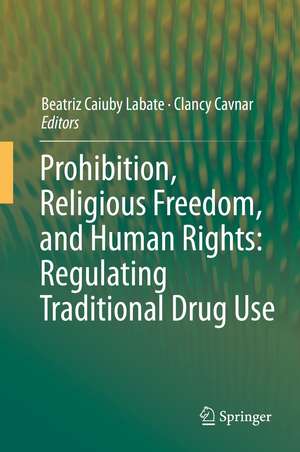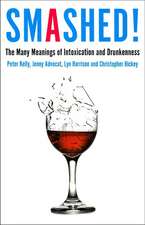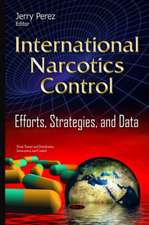Prohibition, Religious Freedom, and Human Rights: Regulating Traditional Drug Use
Editat de Beatriz Caiuby Labate, Clancy Cavnaren Limba Engleză Hardback – 4 apr 2014
| Toate formatele și edițiile | Preț | Express |
|---|---|---|
| Paperback (1) | 943.88 lei 6-8 săpt. | |
| Springer Berlin, Heidelberg – 23 aug 2016 | 943.88 lei 6-8 săpt. | |
| Hardback (1) | 948.16 lei 6-8 săpt. | |
| Springer Berlin, Heidelberg – 4 apr 2014 | 948.16 lei 6-8 săpt. |
Preț: 948.16 lei
Preț vechi: 1156.29 lei
-18% Nou
Puncte Express: 1422
Preț estimativ în valută:
181.45€ • 197.03$ • 152.42£
181.45€ • 197.03$ • 152.42£
Carte tipărită la comandă
Livrare economică 22 aprilie-06 mai
Preluare comenzi: 021 569.72.76
Specificații
ISBN-13: 9783642409561
ISBN-10: 3642409563
Pagini: 300
Ilustrații: XXVI, 254 p. 1 illus. in color.
Dimensiuni: 155 x 235 x 22 mm
Greutate: 0.52 kg
Ediția:2014
Editura: Springer Berlin, Heidelberg
Colecția Springer
Locul publicării:Berlin, Heidelberg, Germany
ISBN-10: 3642409563
Pagini: 300
Ilustrații: XXVI, 254 p. 1 illus. in color.
Dimensiuni: 155 x 235 x 22 mm
Greutate: 0.52 kg
Ediția:2014
Editura: Springer Berlin, Heidelberg
Colecția Springer
Locul publicării:Berlin, Heidelberg, Germany
Public țintă
ResearchCuprins
Foreword: David Courtwright.- Introduction.- Human Rights and Drug Conventions: Searching for Humanitarian Reason in Drug Laws.- Coca in Debate: The Contradiction and Conflict between the UN Drug Conventions and the Real World.- Marijuana and Religious Freedom in the United States.- Peyote, Race, and Equal Protection in the United States.- From the Sacrilegious to the Sacramental: A Global Review of Rastafari Cannabis Case Law.- The Expansion of Brazilian Ayahuasca Religions: Law, Culture and Locality.- Framing the Chew: Narratives of Development, Drugs, and Danger with Regard to Khat (Catha Edulis).- Salvia divinorum, Hallucinogens, and the Determination of Medical Utility.- "Legalize Spiritual Discovery": The Trials of Dr. Timothy Leary.- Cannabis and the Psychedelics: Reviewing the UN Drug Conventions.- Beyond Religious Freedom: Psychedelics and Cognitive Liberty.- Fear and Loathing in Drugs Policy: Risk, Rights, and Approaches to Drug Policy and Practice.
Notă biografică
Beatriz Caiuby Labate has a Ph.D. in Social Anthropology from the State University of Campinas (UNICAMP), Brazil. Her main areas of interest are the study of psychoactive substances, drug policy, shamanism, ritual, and religion. She is Visiting Professor at the Drug Policy Program of the Center for Economic Research and Education (CIDE) in Aguascalientes, Mexico. She is also Research Associate at the Institute of Medical Psychology, Heidelberg University, co-founder of the Nucleus for Interdisciplinary Studies of Psychoactives (NEIP), and editor of NEIP’s website (http://www.neip.info). She is author, co-author, and co-editor of twelve books, one special-edition journal, and several peer-reviewed articles. For more information, see: http://bialabate.net/
Clancy Cavnar, Psy.D., is currently completing her postdoctoral hours in clinical psychology at the Marin Treatment Center, a methadone clinic in San Rafael, California. In 2011, she received a doctorate in clinical psychology (PsyD) from John F. Kennedy University in Pleasant Hill, California, with a dissertation on gay and lesbian people's experiences with ayahuasca. She attended New College of the University of South Florida and completed an undergraduate degree in liberal arts in 1982. She attended the San Francisco Art Institute and graduated with a Master of Fine Art in painting in 1985. In 1993, she received a certificate in substance abuse counseling from the extension program of the University of California at Berkeley and, in 1997, she graduated with a master's in counseling from San Francisco State University. In that same year, she got in touch with the Santo Daime in the USA, and has traveled several times to Brazil since then. She is Research Associate of the Nucleus for Interdisciplinary Studies of Psychoactives (NEIP), and co-editor, with Beatriz Caiuby Labate, of three books: The Therapeutic Use of Ayahuasca (Springer,2014); Prohibition, Religious Freedom, and Human Rights: Regulating Traditional Drug Use (Springer, 2014) and Ayahuasca Shamanism in the Amazon and Beyond (Oxford University Press, 2014).
Clancy Cavnar, Psy.D., is currently completing her postdoctoral hours in clinical psychology at the Marin Treatment Center, a methadone clinic in San Rafael, California. In 2011, she received a doctorate in clinical psychology (PsyD) from John F. Kennedy University in Pleasant Hill, California, with a dissertation on gay and lesbian people's experiences with ayahuasca. She attended New College of the University of South Florida and completed an undergraduate degree in liberal arts in 1982. She attended the San Francisco Art Institute and graduated with a Master of Fine Art in painting in 1985. In 1993, she received a certificate in substance abuse counseling from the extension program of the University of California at Berkeley and, in 1997, she graduated with a master's in counseling from San Francisco State University. In that same year, she got in touch with the Santo Daime in the USA, and has traveled several times to Brazil since then. She is Research Associate of the Nucleus for Interdisciplinary Studies of Psychoactives (NEIP), and co-editor, with Beatriz Caiuby Labate, of three books: The Therapeutic Use of Ayahuasca (Springer,2014); Prohibition, Religious Freedom, and Human Rights: Regulating Traditional Drug Use (Springer, 2014) and Ayahuasca Shamanism in the Amazon and Beyond (Oxford University Press, 2014).
Textul de pe ultima copertă
This book addresses the use and regulation of traditional drugs such as peyote, ayahuasca, coca leaf, cannabis, khat and Salvia divinorum. The uses of these substances can often be found at the intersection of diverse areas of life, including politics, medicine, shamanism, religion, aesthetics, knowledge transmission, socialization, and celebration. The collection analyzes how some of these psychoactive plants have been progressively incorporated and regulated in developed Western societies by both national legislation and by the United Nations Drug Conventions. It focuses mainly, but not only, on the debates in court cases around the world involving the claim of religious use and the legal definitions of “religion.” It further touches upon issues of human rights and cognitive liberty as they relate to the consumption of drugs. While this collection emphasizes certain uses of psychoactive substances in different cultures and historical periods, it is also useful for thinking about the consumption of drugs in general in contemporary societies. The cultural and informal controls discussed here represent alternatives to the current merely prohibitionist policies, which are linked to the spread of illicit and violent markets. By addressing the disputes involved in the regulation of traditional drug use, this volume reflects on notions such as origin, place, authenticity, and tradition, thereby relating drug policy to broader social science debates.
Caracteristici
Examines debates in court cases around the world involving the claim of religious use and the legal definitions of "religion" Issues of human rights and cognitive liberty related to the consumption of drugs are discussed Alternatives to the merely prohibitionist policies are indicated Includes supplementary material: sn.pub/extras








